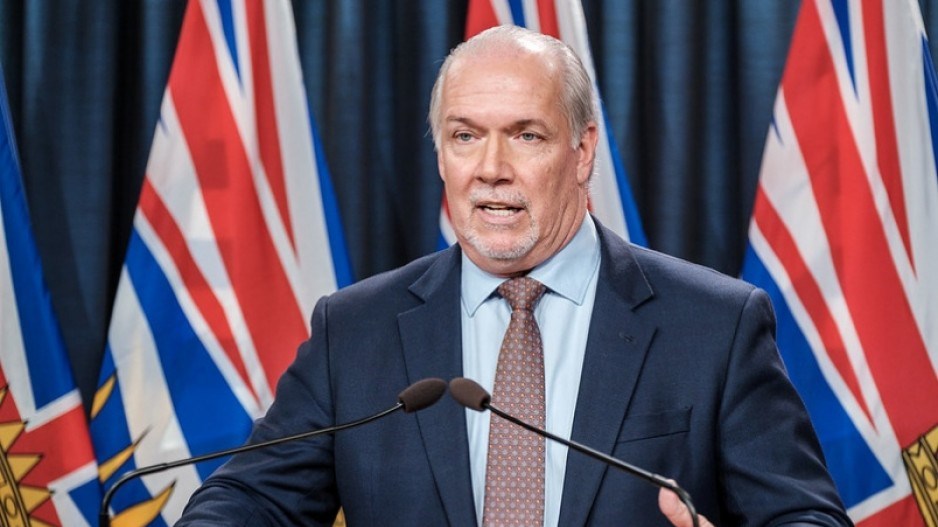A provincial state of emergency has been extended for another two weeks, and is expected to continue for the foreseeable future, B.C. Premier John Horgan said Wednesday.
Horgan advised British Columbians to avoid non-essential travel over the upcoming Victoria Day long weekend, and to continue to wash hands and practise physical distancing.
“We are far from out of the woods,” he said.
Guidelines for reopening a host of businesses and medical services are being finalized with WorkSafe B.C. and public-health officials, and are expected to be announced by early next week.
“I don’t want people’s belief that on the 19th of May, all of a sudden we’re back to normal,” he said. “We are not going to be back to normal. We’re going to start the process to bring back industries that were ordered shut by [provincial health officer Dr. Bonnie] Henry, and she’ll be revising her orders at the appropriate time.”
Health Minister Adrian Dix also advised against travel this weekend: “If you do not need to go somewhere, even if it’s a second home, even if it’s a place you go to every Victoria Day weekend, the way we can help one another now is not to engage in non-essential travel.”
If people determine their trip is essential, Dix asked that they bring their own food and necessities.
Henry announced 16 new cases of COVID-19 on Wednesday for 385 active cases. A total of 2,376 people have tested positive in B.C. since January, and 78% have recovered.
Vancouver Island has seen no new cases in about a week, with one person remaining in hospital. Fifty nine people are in hospital with COVID-19 around the province, while 132 have died from the disease.
Henry said religious services can begin again next week, but the limit of 50 people who can maintain a physical distance of two metres remains in place.
Retail stores can use measures such as transparent plastic barriers at checkout counters and increased cleaning to allow more than 50 people on their premises, as long as people are able to move efficiently through safe spaces and there’s no “congregating or crowding,” she said.
The premier said he and Education Minister Rob Fleming will reveal the province’s plans for schools on Friday.
A dry run will be held in June in preparation for September, when elementary and high schools will resume full operation, he said. Horgan said no layoffs are contemplated, despite the loss of fee-paying international students. “Quite the contrary — as we look at new models, we’re going to probably see an increase and a requirement for teachers and support staff.”
Horgan said that he has reiterated to Prime Minister Justin Trudeau and Deputy Prime Minister Chrystia Freeland that British Columbia is firm on the need to enforce a prohibition on non-essential international travel.
While tourism remains one of the hardest-hit industries, the premier said because “every corner of British Columbia is spectacular,” there’s every reason to assume international travelers will come back to B.C. in the future, when restrictions are lifted.
When the province’s restart plan is underway, there will be “aggressive marketing” through Destination B.C. to promote staycations in B.C., he said.
“I know people will want to visit parts of British Columbia that have been on the list to do but they’ve never been able to find the time to get that done,” said Horgan.
The premier said health officials want people to stay close to home for now. “As the summer unfolds, and the evidence predicts that we can do more, we will do more and we’ll be focusing on the tourism sector,” he said.
Henry said Wednesday that many people are looking for “clear rules that apply to everybody” for social interactions and travel, but it’s more important to use caution and common sense.
“The reality is that our path forward is individual, based on our own unique circumstances,” said Henry. “That goes for businesses as well.”
If you plan to expand your social bubble beyond your household or pandemic contacts, keep your group small and consistent, she said. “Make an agreement with them that you will be part of their bubble and they can be part of yours,” said Henry. “[If] we are in contact with them, we’re in contact with their contacts as well.”
As for the summer ritual of backyard barbecues, Henry suggested keeping to small groups of family or friends with whom you’ve made a bubble “pact” over the coming weeks, and being cognizant of immune-compromised people. Don’t share food, don’t have buffets and don’t share drinks, she said.
“Right now, no hugs and kisses with people who are outside your household or your circle,” said Henry. “Smaller groups, fewer faces, shorter time together, bigger spaces. Those are things that we need to keep in mind over the coming days.”




